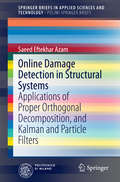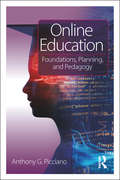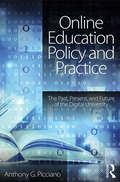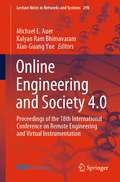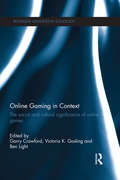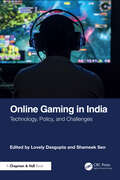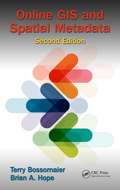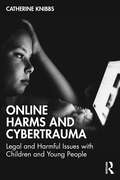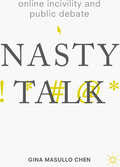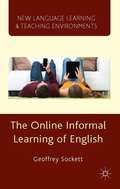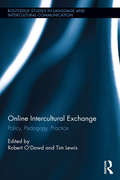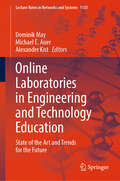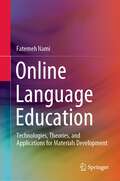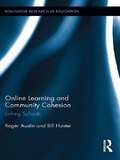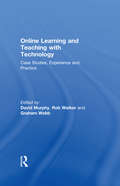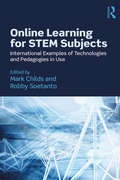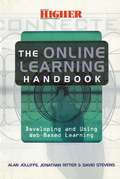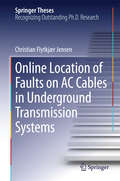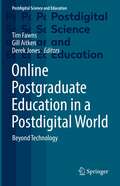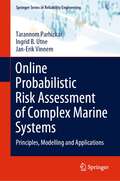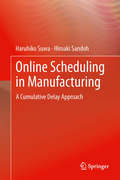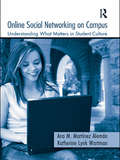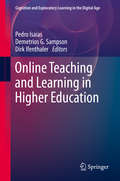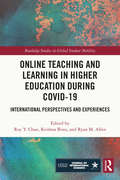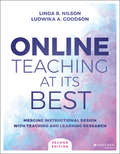- Table View
- List View
Online Damage Detection in Structural Systems
by Saeed Eftekhar AzamThis monograph assesses in depth the application of recursive Bayesian filters in structural health monitoring. Although the methods and algorithms used here are well established in the field of automatic control, their application in the realm of civil engineering has to date been limited. The monograph is therefore intended as a reference for structural and civil engineers who wish to conduct research in this field. To this end, the main notions underlying the families of Kalman and particle filters are scrutinized through explanations within the text and numerous numerical examples. The main limitations to their application in monitoring of high-rise buildings are discussed and a remedy based on a synergy of reduced order modeling (based on proper orthogonal decomposition) and Bayesian estimation is proposed. The performance and effectiveness of the proposed algorithm is demonstrated via pseudo-experimental evaluations.
Online Education: Foundations, Planning, and Pedagogy
by Anthony G. Picciano<i>Online Education</i> is a comprehensive exploration of blended and fully online teaching platforms, addressing history, theory, research, planning, and practice. As colleges, universities, and schools around the world adopt large-scale technologies and traditional class models shift into seamless, digitally interactive environments, critical insights are needed into the implications for administration and pedagogy. Written by a major contributor to the field, this book contextualizes online education in the past and present before analyzing its fundamental changes to instruction, program integration, social interaction, content construction, networked media, policy, and more. A provocative concluding chapter speculates on the future of education as the sector becomes increasingly dependent on learning technologies.
Online Education Policy and Practice: The Past, Present, and Future of the Digital University
by Anthony G. PiccianoOnline Education Policy and Practice examines the past, present, and future of networked learning environments and the changing role of faculty within them. As digital technologies in higher education increasingly enable blended classrooms, collaborative assignments, and wider student access, an understanding of the creation and ongoing developments of these platforms is needed more than ever. By investigating the history of online education, the rise and critique of MOOCs, the mainstreaming of social media, mobile devices, gaming in instruction, and more, this expansive book outlines a variety of potential scenarios likely to become realities in higher education over the next decade.
Online Engineering and Society 4.0: Proceedings of the 18th International Conference on Remote Engineering and Virtual Instrumentation (Lecture Notes in Networks and Systems #298)
by Michael E. Auer Kalyan Ram Bhimavaram Xiao-Guang YueThis book presents the general objective of the REV2021 conference which is to contribute and discuss fundamentals, applications, and experiences in the field of Online and Remote Engineering, Virtual Instrumentation, and other related new technologies like Cross Reality, Data Science & Big Data, Internet of Things & Industrial Internet of Things, Industry 4.0, Cyber Security, and M2M & Smart Objects. Nowadays, online technologies are the core of most fields of engineering and the whole society and are inseparably connected, for example, with Internet of Things, Industry 4.0 & Industrial Internet of Things, Cloud Technologies, Data Science, Cross & Mixed Reality, Remote Working Environments, Online & Biomedical Engineering, to name only a few.Since the first REV conference in 2004, we tried to focus on the upcoming use of the Internet for engineering tasks and the opportunities as well as challenges around it. In a globally connected world, the interest in online collaboration, teleworking, remote services, and other digital working environments is rapidly increasing. Another objective of the conference is to discuss guidelines and new concepts for engineering education in higher and vocational education institutions, including emerging technologies in learning, MOOCs & MOOLs, and Open Resources.REV2021 on "Online Engineering and Society 4.0" was the 17th in a series of annual events concerning the area of Remote Engineering and Virtual Instrumentation. It has been organized in cooperation with the International Engineering and Technology Institute (IETI) as an online event from February 24 to 26, 2021.
Online Gaming in Context: The social and cultural significance of online games (Routledge Advances in Sociology)
by Garry Crawford Ben Light Victoria K. GoslingThere is little question of the social, cultural and economic importance of video games in the world today, with gaming now rivalling the movie and music sectors as a major leisure industry and pastime. The significance of video games within our everyday lives has certainly been increased and shaped by new technologies and gaming patterns, including the rise of home-based games consoles, advances in mobile telephone technology, the rise in more 'sociable' forms of gaming, and of course the advent of the Internet. This book explores the opportunities, challenges and patterns of gameplay and sociality afforded by the Internet and online gaming. Bringing together a series of original essays from both leading and emerging academics in the field of game studies, many of which employ new empirical work and innovative theoretical approaches to gaming, this book considers key issues crucial to our understanding of online gaming and associated social relations, including: patterns of play, legal and copyright issues, player production, identity construction, gamer communities, communication, patterns of social exclusion and inclusion around religion, gender and disability, and future directions in online gaming.
Online Gaming in India: Technology, Policy, and Challenges
by Lovely Dasgupta Shameek SenThis book offers a comprehensive overview from diverse perspectives of online gaming technology, policy, and experiments to understand and review the Indian approach. It starts with the technological viewpoint on the governance and regulation of online gaming and includes the Indian experiment in governing and regulating it. The book brings a nuanced approach related to the perspectives of various stakeholders, the players, the developers, the gamers, the regulators, the law enforcement agencies, the industry and most importantly, the consumers, who are also the intended audience of the work. Present a holistic view of the online gaming industry from technical, legal and policymaking perspectives Offers critical technical highlights include Online transactions, online games ecosystem, online games varied platforms, web3, metaverse, AI and Fantasy Games Includes a comparative analysis to evaluate better the laws, rules, and regulations and the governance of online gaming in India Encapsulates the Indian experience in intervening and streamlining the online gaming industry The book is for Professionals and scholars in the fields of Online Gaming in computer science, Law, and other related discipline. It also serves as a textbook for students for Online Gaming courses.
Online GIS and Spatial Metadata
by Terry Bossomaier Brian A. HopeImplement Your Own Applications Using Online GISAn in-depth study detailing the online applications of geographic information systems (GIS), Online GIS and Spatial Metadata, Second Edition outlines how GIS data are published, organized, accessed, searched, maintained, purchased, and processed over the web. This latest work describes how the interne
Online Harms and Cybertrauma: Legal and Harmful Issues with Children and Young People
by Catherine KnibbsThis vital, sensitive guide explains the serious issues children face online and how they are impacted by them on a developmental, neurological, social, mental health and wellbeing level. Covering technologies used by children aged two through to adulthood, it offers parents and professionals clear, evidence-based information about online harms and their effects and what they can do to support their child should they see, hear or bear witness to these events online. Catherine Knibbs, specialist advisor in the field, explains the issues involved when using online platforms and devices in family, social and educational settings. Examined in as non-traumatising a way as possible, the book covers key topics including cyberbullying; cyberstalking; pornography; online grooming; sexting; live streaming; vigilantism; suicide and self-harm; trolling and e-harassment; bantz, doxing and social media hacking; dares, trends and life-threatening activities; information and misinformation; and psychological games. It also explores the complex overlap of offline and online worlds in children and young people’s lives. Offering guidance and proactive and reactive strategies based in neuroscience and child development, it reveals how e-safety is not one size fits all and must consider individual children’s and families’ vulnerabilities. Online Harms and Cybertrauma will equip professionals and parents with the knowledge to support their work and direct conversations about the online harms that children and young people face. It is essential reading for those training and working with children in psychological, educational and social work contexts, as well as parents, policy makers and those involved in development of online technologies.
Online Incivility and Public Debate
by Gina Masullo ChenThis book investigates what influence online incivility--through user-generated comments on news websites--has on public debate. Built on the premise that public discussions about important topics are vital to a healthy democracy, the book analyzes 3,508 online comments in order to understand what factors in comments make them more susceptible to incivility, defined as nasty remarks rife with profanity. It also examines comments for attributes of deliberation, which are discussions across difference supported by evidence and rational arguments. Using an experiment, the book shows that uncivil comments jumpstart a chain reaction, leading first to negative emotion and then to greater intention to get politically involved. Overall, Online Incivility and Public Debate: Nasty Talk argues that while incivility mars online debate, it may also spark interest in important topics and allow for positive "deliberative moments" of quality discussion.
The Online Informal Learning of English
by Geoffrey SockettYoung people around the world are increasingly able to access English language media online for leisure purposes and interact with other users of English. This book examines the extent of these phenomena, their effect on language acquisition and their implications for the teaching of English in the 21st century.
Online Intercultural Exchange: Policy, Pedagogy, Practice (Routledge Studies in Language and Intercultural Communication #15)
by Tim Lewis Robert O'DowdThis volume provides a state of the art overview of Online Intercultural Exchange (OIE) in university education and demonstrates how educators can use OIE to address current challenges in university contexts such as internationalisation, virtual mobility and intercultural foreign language education. Since the 1990s, educators have been using virtual interaction to bring their classes into contact with geographically distant partner classes to create opportunities for authentic communication, meaningful collaboration and first-hand experience of working and learning with partners from other cultural backgrounds. Online exchange projects of this nature can contribute to the development of learner autonomy, linguistic accuracy, intercultural awareness, intercultural skills and electronic literacies. Online Intercultural Exchange has now reached a stage where it is moving beyond individual classroom initiatives and is assuming a role as a major tool for internationalization, intercultural development and virtual mobility in universities around the globe. This volume reports qualitative and quantitative findings on the impact of OIE on universities in Europe and elsewhere and offers comprehensive guidance on using OIE at both pedagogical and technological levels. It provides theoretically-informed accounts of Online Intercultural Exchanges which will relevant to researchers in Computer Assisted Language Learning, Computer-Mediated Communication, or Virtual Education. Finally, contributors offer a collection of practitioner-authored and practically-oriented case studies for the benefit of teachers of foreign languages or in other subject areas who wish to engage in developing the digital literacy and intercultural competences of their learners.
Online Laboratories in Engineering and Technology Education: State of the Art and Trends for the Future (Lecture Notes in Networks and Systems #1135)
by Dominik May Michael E. Auer Alexander KistThis comprehensive book, divided into seven sections, showcases groundbreaking research findings that blend new experiences from the COVID-19 pandemic with long-term research on online laboratories and virtual experimentation. Providing an adequate learning experience in the laboratory has long been a major challenge in science, engineering, and technology education. Recent years have further revealed the complexities of offering distance or remotely accessible educational settings, particularly for laboratory-based courses. In response, many academic institutions have innovated by transitioning their laboratory classes into online laboratories or providing laboratory kits for at-home use. This unprecedented situation has sparked numerous new developments, approaches, and activities, revolutionizing the field. With contributions from leading researchers and practitioners across diverse disciplines, this book delves into current trends, addresses critical challenges, and uncovers future opportunities for laboratory-based education in the context of online learning. Whether readers are educators seeking innovative teaching strategies, researchers exploring the latest advancements, or academic leaders looking to enhance remote learning experiences, this book provides valuable insights and practical solutions. It explores how online laboratories are transforming education and discovers the potential they hold for the future.
Online Language Education: Technologies, Theories, and Applications for Materials Development
by Fatemeh NamiThis book addresses the gap between Computer-Assisted Language Learning (CALL) materials development and its theoretical considerations by offering a comprehensive look into theory, practice, and research on materials development and content authoring for language instruction/practice, drawing on the author’s personal experiences along with previous empirical/theoretical research in CALL materials development, content authoring, language teacher education, and e-learning. The book features four sections. In addition to highlighting related theoretical underpinnings, key concepts, linguistic-didactic functionalities and interaction scenarios in materials development, the volume will address the practical issues and considerations not only in the design, development, integration, and evaluation of the technology-enhanced materials development for language instruction but also the protection, usability, and access in authored and/or co-authored content. Furthermore, previous research findings and foci are addressed to highlight the research gaps and pedagogical implications for materials developers, policy makers, and language teachers. The book can help teachers, educators, and researchers overcome the aforementioned problem by providing a step-by-step guideline on how to effectively integrate technology and design and develop instructional materials for online language instruction and practice.
Online Learning and Community Cohesion: Linking Schools (Routledge Research in Education #98)
by Roger Austin Bill HunterNational governments and multi-national institutions are spending unprecedented amounts of money on ICT on improving the overall quality of school learning, and schools are increasingly expected to prepare young people for a global economy in which inter-cultural understanding will be a priority. This book explores and analyzes the ways ICT has been used to promote citizenship and community cohesion in projects that link together schools in different parts of the world. It examines the theoretical framework behind such work and shows the impact of initiatives in the Middle East, Canada, the USA, England, Northern Ireland, the Republic of Ireland and elsewhere in the European Union. This is a critical examination of the technologies that have been deployed, the professional development that has been provided and an evaluation of what constitutes good practice, particularly in terms of what collaborative learning really means for young people. Many of these initiatives have enabled young people to develop more positive relations with culturally and religiously different neighbours, but this work has just begun. Continuing international tensions over matters of identity and faith require that we better understand the political context for such work so that we might shape future directions more deliberately and more clearly.
Online Learning and Teaching with Technology: Case Studies, Experience and Practice
by Rob Walker David Murphy Graham WebbIn the 21st century technology has become an essential part of teaching and learning. This manual provides practical advice on teaching in a wide range of technologies, including the internet and multimedia packages. Using case studies to illustrate the key concepts, this book aims to promote student learning and understanding, and show educators how to use technology to motivate learners and encourage productive interaction.
Online Learning for STEM Subjects: International Examples of Technologies and Pedagogies in Use
by Mark Childs Robby SoetantoThe Global Collaboration initiatives related in this book are examples of how educators have experimented with different mechanisms to provide science, technology, engineering and mathematics (STEM) education programmes through information and communication technologies. In many cases, these programmes have looked at the allied personal communication and collaboration skills that students of these subjects also need: the so-called STEM+ curriculum. In particular, these approaches to STEM+ provision show how the internationalization of education can be made more effective and accessible through the exploitation of collaborative technologies and non-traditional pedagogies. The approaches address the following themes: technologies for distance learning and collaboration pedagogies for online learning remote communication and collaboration An international perspective is made possible within the book through the inclusion of authors from North America, Europe and Asia. These authors present case studies from technology-enhanced learning projects over the past six years.
The Online Learning Handbook: Developing and Using Web-based Learning
by David Stevens Alan Jolliffe Jonathan RitterA guide to developing Web-based learning materials. It provides advice, tools and techniques to help readers harness the potential of on-line methods of instruction and education. Taking a simple step-by-step approach, it proceeds from the basics through to operating computer-managed learning.
Online Location of Faults on AC Cables in Underground Transmission Systems
by Christian Flytkjær JensenThis book reports on various techniques for fault location on cross bonded cables, identifies the best method and describes the construction of a full fault locator system. The developed system is able of pinpointing the fault location on long cross-bonded cable systems and will be installed in Danish substations for monitoring the coming cable-based transmission grid. The work was conducted as part of a collaborative project between the department of energy technology at Aalborg University and the Danish transmission system operator for electricity and natural gas, Energinet. dk.
Online Postgraduate Education in a Postdigital World: Beyond Technology (Postdigital Science and Education)
by Tim Fawns Gill Aitken Derek JonesThis edited volume builds upon the premise that online learning is not separate from the social and material world, and is made up of embodied, socially-meaningful experiences. It is founded on a “postdigital” perspective in which, much more than interactions with keyboards, computer screens, hardware or software, the learning that happens on online postgraduate programmes spills out into professional and informal settings, making connections with what comes before and after any formally-scheduled tasks. Unlike other books relating to online education, this book combines a theoretical perspective, in which the digital, physical and social are all interconnected within complex educational ecologies, with a focus grounded in postgraduate practice. This focus has important implications for the kinds of students and learning that are explored in the chapters of the book. This book provides an important contribution to the knowledge of what is required to produce quality, online postgraduate programmes at the level of teachers, curriculum designers, faculty developers and policy-makers.
Online Probabilistic Risk Assessment of Complex Marine Systems: Principles, Modelling and Applications (Springer Series in Reliability Engineering)
by Tarannom Parhizkar Ingrid B. Utne Jan-Erik VinnemThis book proposes a new approach to dynamic and online risk assessment of automated and autonomous marine systems, taking into account different environmental and operational conditions. The book presents lessons learnt from dynamic positioning incidents and accidents, and discusses the challenges of risk assessment of complex systems. The book begins by introducing dynamic and online risk assessment, before presenting automated and autonomous marine systems, as well as numerous dynamic positioning incidents. It then discusses human interactions with technology and explores how to quantify human error. Dynamic probabilistic risk assessment and online risk assessment are both considered fully, including case studies with the application of assisting operators in decision making in emergency situations. Finally, areas for future research are suggested. This practical volume offers tools and methodologies to help operators make better decisions and improve the safety of automated and autonomous marine systems. It provides a guideline for researchers and practitioners to perform dynamic probabilistic and online risk assessment, which also should be applicable to other complex systems outside the marine and maritime domain, such as nuclear power plants, chemical processes, autonomous transport systems, and space shuttles.
Online Scheduling in Manufacturing
by Hiroaki Sandoh Haruhiko SuwaOnline scheduling is recognized as the crucial decision-making process of production control at a phase of "being in production" according to the released shop floor schedule. Online scheduling can be also considered as one of key enablers to realize prompt capable-to-promise as well as available-to-promise to customers along with reducing production lead times under recent globalized competitive markets. Online Scheduling in Manufacturing introduces new approaches to online scheduling based on a concept of cumulative delay. The cumulative delay is regarded as consolidated information of uncertainties under a dynamic environment in manufacturing and can be collected constantly without much effort at any points in time during a schedule execution. In this approach, the cumulative delay of the schedule has the important role of a criterion for making a decision whether or not a schedule revision is carried out. The cumulative delay approach to trigger schedule revisions has the following capabilities for the practical decision-making: 1. To reduce frequent schedule revisions which do not necessarily improve a current situation with much expense for its operation; 2. To avoid overreacting to disturbances dependent on strongly an individual shop floor circumstance; and 3. To simplify the monitoring process of a schedule status. Online Scheduling in Manufacturing will be of interest to both practitioners and researchers who work in planning and scheduling in manufacturing. Readers will find the importance of when-to-revise policies during a schedule execution and their influences on scheduling results.
Online Social Networking on Campus: Understanding What Matters in Student Culture
by Ana M. Martínez-Alemán Katherine Lynk WartmanIn the era of such online spaces as Facebook, Instant Messenger, Live Journal, Blogger, Web Shots, and campus blogs, college students are using these resources and other online sites as a social medium. Inevitably, this medium presents students with ethical decisions about social propriety, self disclosure and acceptable behaviour. Because online social networking sites have proven problematic for college students and for college administrators, this book aims to offer professional guidance to Higher Education administrators and policy makers. Online Social Networking on Campus: Understanding what matters in student culture is a professional guide for Higher Education faculty and Student Affairs administrators, which rigorously examines college students’ use of online social networking sites and how they use these to develop relationships both on and off campus. Most importantly, Online Social Networking on Campus investigates how college students use online sites to explore and makes sense of their identities. Providing information taken from interviews, surveys and focus group data, the book presents an ethnographic view of social networking that will help Student Affairs administrators, Information Technology administrators, and faculty better understand and provide guidance to the "neomillennials" on their campuses.
Online Teaching and Learning in Higher Education (Cognition and Exploratory Learning in the Digital Age)
by Dirk Ifenthaler Pedro Isaias Demetrios G. SampsonThis book is to explores a variety of facets of online learning environments to understand how learning occurs and succeeds in digital contexts and what teaching strategies and technologies are most suited to this format. Business, health, government and education are some of the core sectors of society which have been experiencing deep transformations due to a generalized digitalization. While these changes are not novel, the swift progress of technology and the rising complexity of digital environments place a focus on the need for further research and novel strategies. In the context of education, the promise of increased flexibility and broader access to educational resources is impelling much of higher education’s course offerings to online environments. The 21st century learner requires an education that can be pursued anytime and anywhere and that is more aligned with the demands of a digital society. Online education not only assists students to success-fully integrate a workforce that is increasingly digital, but it helps them to become more comfortable with the use of technology in general and, hence, more prepared to be prolific digital citizens. The variety of settings portrayed in this volume attest to the unlimited opportunities afforded by online learning and serve as valuable evidence of its benefit for students’ educational experience. Moreover, these research efforts assist a more comprehensive reflection about the delivery of higher education in the context of online settings.
Online Teaching and Learning in Higher Education during COVID-19: International Perspectives and Experiences (Routledge Studies in Global Student Mobility)
by Roy Y. Chan Krishna Bista Ryan M. AllenThis timely volume documents the immediate, global impacts of the coronavirus pandemic (COVID-19) on teaching and learning in higher education. Focusing on student and faculty experiences of online and distance education, the text provides reflections on novel initiatives, unexpected challenges, and lessons learned. Responding to the urgent need to better understand online teaching and learning during the COVID-19 pandemic, this book investigates how the use of information and communication technologies (ICT) impacted students, faculty, and staff experiences during the COVID-19 lockdown. Chapters initially look at the challenges faced by universities and educators in their attempts to overcome the practical difficulties involved in developing effective online programming and pedagogy. The text then builds on these insights to highlight student experiences and consider issues of social connection and inequality. Finally, the volume looks forward to asking what lessons COVID-19 can offer for the future development of online and distance learning in higher education. This engaging volume will benefit researchers, academics, and educators with an interest in online teaching and eLearning, curriculum design, and more, specifically those involved with the digitalization of higher education. The text will also support further discussion and reflection around pedagogical transformation, international teaching and learning, and educational policy more broadly.
Online Teaching at Its Best: Merging Instructional Design with Teaching and Learning Research
by Linda B. Nilson Ludwika A. GoodsonBring pedagogy and cognitive science to online learning environments Online Teaching at Its Best: Merging Instructional Design with Teaching and Learning Research, 2nd Edition, is the scholarly resource for online learning that faculty, instructional designers, and administrators have raved about. This book addresses course design, teaching, and student motivation across the continuum of online teaching modes—remote, hybrid, hyflex, and fully online—integrating these with pedagogical and cognitive science, and grounding its recommendations in the latest research. The book will help you design or redesign your courses to ensure strong course alignment and effective student learning in any of these teaching modes. Its emphasis on evidence-based practices makes this one of the most scholarly books of its kind on the market today. This new edition features significant new content including more active learning formats for small groups across the online teaching continuum, strategies and tools for scripting and recording effective micro-lectures, ways to integrate quiz items within micro-lectures, more conferencing software and techniques to add interactivity, and a guide for rapid transition from face-to-face to online teaching. You’ll also find updated examples, references, and quotes to reflect more evolved technology. Adopt new pedagogical techniques designed specifically for remote, hybrid, hyflex, and fully online learning environments Ensure strong course alignment and effective student learning for all these modes of instruction Increase student retention, build necessary support structures, and train faculty more effectively Integrate research-based course design and cognitive psychology into graduate or undergraduate programs Distance is no barrier to a great education. Online Teaching at Its Best provides practical, real-world advice grounded in educational and psychological science to help online instructors, instructional designers, and administrators deliver an exceptional learning experience even under emergency conditions.
